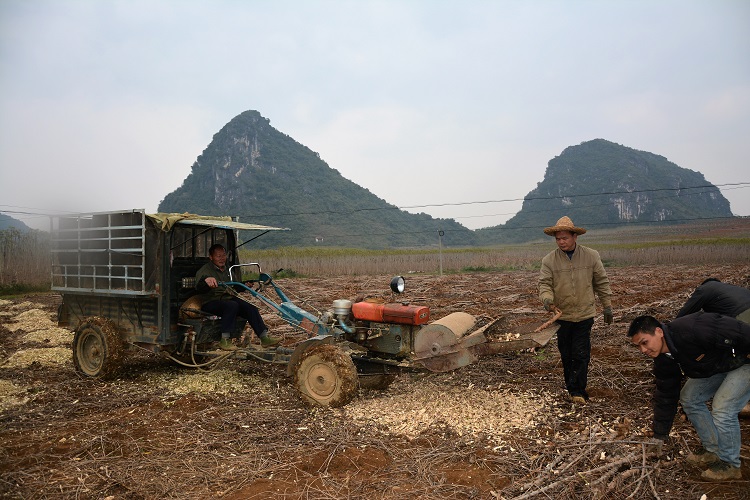At the beginning of the year, NRI embarked on a series of engagements in China, including involvement in the First World Congress on Root and Tubers Crops and the signing of a number of agreements with Chinese Research Institutes and Universities.
We begin with the First World Congress on Root and Tubers Crops (WCRTC) which took place in Nanning, China, January 2016. The Congress was a unique event since it was the first time that the International Society for Tropical Root Crops (ISTRC) and the Global Cassava Partnership for the 21st Century (GCP21) joined forces to organise a combined congress. The Congress was hosted by the Guangxi Subtropical Crops Research Institute, Nanning in partnership with the Chinese Academy of Tropical Agricultural Sciences and the Shanghai Institute for Biological Sciences of the Chinese Academy of Sciences.
“This was an excellent opportunity to bring together scientific experts on root and tuber crops from all over the globe,” said NRI’s Keith Tomlins, President of the ISTRC. “It was a privilege to hold the event in China, where we forged new friendships and collaborative partnerships.” In his inaugural address, Keith highlighted the global importance of roots and tubers for creating employment, ensuring food security, and tackling challenges such as climate change in the context of the UN Sustainable Development Goals. In a subsequent presentation on ‘waste into gains’, Keith discussed turning root crop waste into profitable products based on experiences from Africa and Asia. NRI Director and former President of the ISTRC, Andrew Westby, presented some of NRI’s award-winning work on roots and tubers that contributed to winning the Queen’s Anniversary Prize. Other NRI colleagues who shared their insights on roots and tubers at the Congress include Aurélie Bechoff, Ben Bennett, Maruthi Gowda, Andy Graffham, Andy Marchant and Ola Ogunyinka.
The event, organised by the local Chinese Congress Committee chaired by Professor Yinong Tian, together with Dr Claude Fauquet of GCP21, included a presentation ceremony for awards including the ISTRC Lifetime Achievement Award, GCP21’s ‘Golden Cassava Award’, and Congress awards for best poster and oral presentations.
The Congress ended with a field trip to the Guangxi Research Institute (GRI) and a starch factory. At GRI, participants learnt about new developments in mechanical harvesting of cassava in farmers’ fields, a process that may increasingly become important in parts of Africa where there is a shortage of labour or increased need for mechanisation. The visit to the starch factory enabled participants to gain a better understanding of Chinese operations in starch production from cassava and how to turn waste into something of value through the production of gas and biogas animal feed.
“NRI made an important contribution to this congress,” said NRI’s Deputy Director, Ben Bennett. “I had the opportunity to speak to delegates from all over the root and tuber crops world and learnt how our work at NRI, in combination with others, is contributing to achieving the Sustainable Development Goals.”
 NRI’s partnerships with Chinese organisations was strengthened with the signing of ‘Memoranda of Understanding’ (MoUs) in Hainan, China, on 24th and 27th January 2016. NRI signed MoUs with the Tropical Crops Genetic Resources Institute, Chinese Academy of Tropical Agricultural Sciences, the central offices of the Chinese Academy of Tropical Agricultural Sciences and Hainan University. These agreements mean that the organisations involved agree to collaborate on joint research initiatives including applying for many types of research funding between the EU and China.
NRI’s partnerships with Chinese organisations was strengthened with the signing of ‘Memoranda of Understanding’ (MoUs) in Hainan, China, on 24th and 27th January 2016. NRI signed MoUs with the Tropical Crops Genetic Resources Institute, Chinese Academy of Tropical Agricultural Sciences, the central offices of the Chinese Academy of Tropical Agricultural Sciences and Hainan University. These agreements mean that the organisations involved agree to collaborate on joint research initiatives including applying for many types of research funding between the EU and China.
Links: WCRTC | ISTRC | GCP21 | Guangxi Subtropical Crops Research Institute | Chinese Academy of Tropical Agricultural Sciences | Shanghai Institute for Biological Sciences of the Chinese Academy of Sciences | NRI’s Development Programme ‘Root and Tuber Crops in Development’ | NRI’s cassava programme


